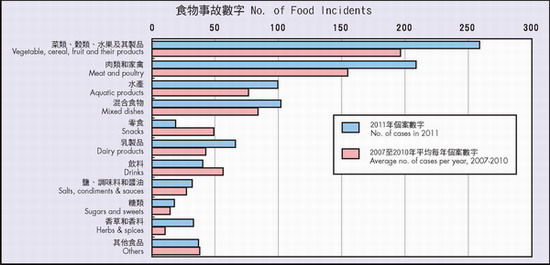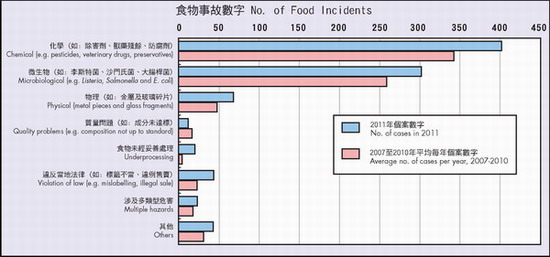
Food Safety Focus (68th Issue, March 2012) – Incident in Focus
Review of Food Incidents in 2011
Reported by Dr. Bo-yee SHU, Medical & Health Officer,
Risk Management Section,
Centre for Food Safety
An ever-increasing international food trade means food safety problems could spread within hours from one part of the world to another. In order to ensure the safety of food supplies to Hong Kong, the Centre for Food Safety (CFS) monitors local and overseas food incidents on a daily basis.
Food Incidents in 2011
Food incidents refer to incidents or events which have potential food safety implications and are regularly detected by monitoring of key information sources including both overseas major food authorities and media agencies, and local media reports. In 2011, a total of 915 food incidents were identified by the CFS. This was slightly higher than the annual figure of about 750 from 2007 to 2010. As in past years, non-local cases accounted for the majority at 98.4 per cent. Cases reported from Taiwan and the United States increased by over 150 in 2011 contributing to the increase in the overall statistics.

Figure 1. Number of food incidents by food commodity, 2007-2011.
As for the food concerned, those involving vegetables, cereal, fruits and their products had the greatest increase, followed by those concerning meat and poultry (Figure 1). Most cases were related to unsatisfactory level of chemical agents such as pesticides and veterinary drugs, or microbiological hazards such as Listeria, Salmonella and E.coli (Figure 2). The distribution on the whole remained similar to the past years.

Figure 2. Number of food incidents by type of hazards/problems, 2007-2011.
Actions Taken by CFS
For each of these food incidents, the CFS assessed its public health significance and took appropriate follow up actions, ranging from contacting the relevant authorities for more information, issuing rapid trade alert, conducting sales check, and taking food samples for testing, making public announcement and initiating recall or issuing prohibition order. In 2011, the CFS issued about 400 trade alerts and over 40 press releases related to these incidents. Another 26 food alerts were issued and seven food recalls were initiated. The latter involved invoking Section 78B Order of Public Health and Municipal Services Ordinance (Cap. 132) to order the trade to recall and stop selling of the concerned products.
Important Food Incidents
In 2011, a number of food incidents were detected which sparked significant concerns on food safety in Hong Kong . Some of them are highlighted below.
- Radiation-Contaminated Food from Japan
Since the Fukushima nuclear power plant incident subsequent to the earthquake on 11 March 2011 in Japan, the CFS has stepped up surveillance of imported Japanese food for radiation testing.
On 23 March 2011, three vegetable samples were found to contain Iodine-131 exceeding the Codex Guideline Levels. An order was made to prohibit import and supply of specified foods from five Japanese prefectures with effect from noon 24 March 2011 . Seven other samples of vegetables and tea leaf/powder were found with low radiation levels not exceeding the Codex Guideline Levels. All consignments related to the aforesaid samples were disposed of and did not enter the local market.
To date, the enhanced surveillance on Japanese food and the prohibition order are still in force. The surveillance results are continued to be uploaded onto the CFS website every working day at the designated webpage on Nuclear Event and Food Safety.
- Plasticisers-tainted Food
The Food and Drug Administration in Taiwan announced on 23 May 2011 that plasticisers had been detected in samples of drinks as a result of illicit use of clouding agents containing plasticisers.
The CFS immediately took follow up actions including alerting relevant traders, conducting sales check, and commencing enhanced food surveillance for plasticisers.
Subsequently, a total of 49 unsatisfactory food samples were found, with the last detected on 24 August. Six orders were issued to prohibit the import and supply as well as to direct recall of plasticisers-tainted products which might pose public health risks. Details can be found at the designated webpage on Plasticisers in Food . Testing of plasticisers had been included in the regular food surveillance programme since October 2011.
- Milk Products Contaminated with Volatile Organic Compounds
In early December 2011, a local dairy products manufacturer withdrew some of its milk products from the market because of possible contamination with volatile organic compounds.
This action was taken in the wake of several complaints received by the company directly and by CFS since late November 2011 concerning abnormal odour in the products. The CFS immediately inspected the milk factory and took samples from the complainants and the relevant retail outlets for testing.
Test results showed that ten samples contained volatile organic compounds which should not normally exist in any milk products. Subsequent investigation showed that the contamination might be due to improper use of volatile organic compounds in maintenance works of the warehouse. The CFS instructed the manufacturer to immediately recall all paper pack milk products from the market and take necessary remedial actions. Follow up samples were tested with satisfactory results. Details of the incident can be found from CFS's press release and food alert on 3 December 2011.
Conclusion
Early intervention of food incidents is vital in controlling and aborting the potential risks associated with food hazards. The effective food incident surveillance and response system put in place has enabled the CFS to detect and manage food incidents in a timely manner.

